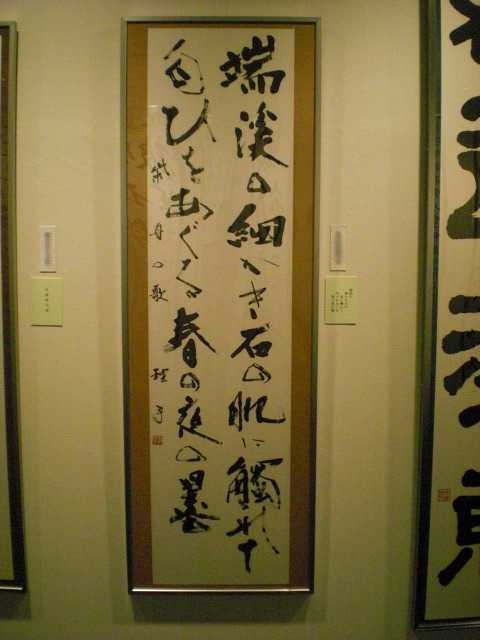Today in shuuji I managed an acceptable oseisho for the winter haiku I've been working on—
手で顔を撫づれば鼻の冷たさよ
te de kao o nadzureba
hana no tsumetasa yo
when i run my hands over my face—
how cold my nose is!
(Kyoshi)
So, it's time to choose a new poem, a haiku or a tanka. Sensei tells me that the season should be mid-spring, so I'll have to see what I can find.
Cさん is working on an interesting one about suzuri:
たんけいのこまかきいしのはだ(え?)(に)ふれて、におひをあぐるはるのよのすみ
tankei no komakaki ishi no hada ni furete
nioi o aguru—haru no yo no sumi
Always tough for me to figure these out, but here's a shot:
端渓の
細かき石の肌(え?)(に)触れて
匂いをあぐる—
春の夜の墨
There seem to be (naturally!) a few ways to read this, depending on what you consider as modifying what, but the sense seems to be that when the poet touches a little suzuri from Tankei, it gives off the light fragrance of sumi ink on a spring night. Sensei told Cさん that Tankei Prefecture, in China (I think), is famous for its inkstones (suzuri, 硯). "Hada ni furete" seems to mean when skin touches stone; whether "hada" is skin or another surface isn't quite clear, but the idea of "coming into contact with" seems appropriate.
I'm even more uncertain about "hada ni furete" because the meter is off. I'd think this could be solved either by adding "e" ("hadae ni furete")—though that would result in an inappropriately seven-mora line, and I'm not sure "hada" and "hadae" are semantically equivalent—or, maybe, by dropping the particle "ni", if that's legal in this case, and saying just "hada furete". I'll have to find my pages of spring poems and look up the original.
Anyway, it's a nice image, no?
Update: I should have mentioned that Cさん's poem is by 尾上柴舟 ONOE Saishuu (1876–1957), a poet and calligrapher who seems to have been involved in "magazine wars" with another school of poetry, passions of human nature vs. ordinary experience (such as sniffing one's suzuri). It would be interesting to, one of these days, attempt to diagram all these schools, journals, literary circles, and teaching relationships. Just about every poet whose work we've written taught, was taught by, or was a colleague of someone else we've written. Maybe I'll try it with genealogy software. :-D

